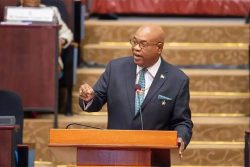Arguing that the granting of scholarships to two government ministers appeared to be a continuation of suspected old practices, Transparency Institute Guyana Inc (TIGI) yesterday called on the government to enhance transparency and accountability of the programme.
TIGI’s statement followed one by the Department of the Public Service on Wednesday which said that it was working on greater transparency in the scholarship programme. The Department of Public Service statement made no mention at all about the controversy over the ministerial scholarships.
TIGI yesterday said it has taken note of the statement from the Department of the Public Service and that this statement had arrived as TIGI was making the final decision on its draft on the matter.
Contending that there is no place for cronyism, nepotism, favouritism and other biases in such awards, TIGI said it would be a flagrant betrayal of the citizens and corrupt behaviour if government scholarships are awarded based on friendship or connection to the government.
It noted that an alarm was raised last year about the award of scholarships to two sitting Ministers of Government, Nicolette Henry and Annette Ferguson to pursue doctoral studies. On the one hand, TIGI said that there is the governance issue about the appropriateness of officials with such important roles dividing their attention between serving the people and pursuing studies. On the other hand, there is the suspicion of impropriety in the awards, TIGI said.
“Neither of these points has been adequately refuted and TIGI remains concerned especially about the accusation of impropriety”, the transparency group stated. TIGI added that the Guyanese society has long recognized that there was bias in awards of scholarships. The accusation, it said, is that direct or indirect intervention from individuals in government occurred in some cases and this has eroded public confidence.
Bias in scholarship awards, TIGI declared should be viewed with the recognition that there is ultimately a cost to the public. Even when they are not funded by taxpayers, TIGI said that there is still an opportunity cost to those who might be more deserving. “The situation in which two sitting Ministers with such prominent roles in government, have been awarded scholarships by said government appears as a continuation of suspected old practices. The President indicated in the January 20, 2017 edition of the Public Interest programme that he did `not know the grounds for these specific cases’ but said that `on the face of it, it is not a corrupt transaction’. The President was speaking here hypothetically for he could not be asserting that the particular awards were not corrupt while admitting his lack of knowledge about the two cases. The public therefore remains understandably sceptical and a lack of corruption in the awards of the scholarships is yet to be substantiated”, TIGI declared.
It called on the government to boost transparency and accountability of the scholarship programme by creating rules to guarantee annual publication of the list of awardees along with some basic information about the individuals. This, TIGI said, should include, the amount awarded and the institution and programme of study, without undue violations of privacy.
“We also call for articulation and publication of the evaluation and decision criteria for scholarship awards. An added benefit of this will be increased awareness of what is available and who can apply which can potentially enhance the reach and impact of the programme. Finally, the government should make the scoresheets based on which the awards were determined available upon request as an initial step towards accountability”, TIGI said.
In its statement on Wednesday, the Department of the Public Service said that while during the previous administration, applicants were often handpicked and shortlisted by the Ministry of the Public Service, the Department now has a National Panel, the first in this regard, which consists of professionals from the Education Ministry, private and other sectors who are entrusted with shortlisting and interviewing applicants. The panel comprises veteran educators: Ingrid Fung and Donna Chapman, Private Sector Commission Representative, Elizabeth Alleyne, Claudette Austin from the University of Guyana and Executive Director of the Public Service Staff College, Randolph Leitch. From July 2015 to date, more than 500 applications have been processed, the statement said.
Applicants must be 35 years or under and in good health to qualify, must gain entrance to the University they wish to attend and must have a valid Guyana passport. All applications are reviewed by this panel and applicants are shortlisted and invited for interviews.
During the interview process, applicants are graded in five main areas: qualifications (10 points), relevance of scholarship (10 points), adaptability (4 points) and ability to cope in a different environment (for overseas students), experience in the field (for Post Graduates), maturity (for Under Graduates) (4 points), acceptance of scholarship conditions (2 points) and knowledge of the field of studies. Once the points have been totalled from the interviews, the recommendations are then sent to the Permanent Secretary and the Minister of State, Joseph Harmon, who has responsibility for the Public Service sector.








